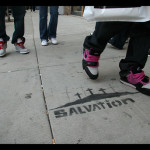We run our website the way we wished the whole internet worked: we provide high quality original content with no ads. We are funded solely by your direct support. Please consider supporting this project.
Everybody’s Got a Prequel
My wife and I, along with some friends, recently attended the Broadway Play Wicked. Without giving too much away, I’ll tell you the play attempts to answer the question: What could have possibly made the “Wicked Witch of the West” so [apparently] evil (as presented in the original Wizard of Oz)? After all, normal young ladies don’t just wake up one day and decide to find their enjoyment in tormenting poor Scare Crows, Tin Men, Cowardly Lions and little farm girls with their “mangy little dogs.”
Might it have something to do with the fact that she was born green?
By giving us “the rest of the story,” the play “Wicked” exposes how little we really knew about this “Wicked Witch” from the original Wizard of Oz and how shallow and misguided our initial judgments about her were. By giving us the “prequel” to her life, we’re moved toward compassion instead of judgment.
The fact is, all of us have a “prequel.” From the mass murderers to the terrorists to the pedophiles to the prostitutes to the gang members — and, yes, even to the gossipers, gluttons and judgers — there’s a story which, if we knew it well, would help explain why they are the way they are. People don’t just decide one day to be wicked. Things happen. There’s always a story to be told.
Does this mean that people aren’t morally accountable for their actions? Not at all. For we are not just products of our environment and genes. We make choices, for which we’re responsible. But it does mean that only God knows the extent of our moral accountability, which is why only he can legitimately judge another person (I Sam. 16:7).
Does this mean that society shouldn’t take strong measures to protect itself from murderers, pedophiles and the like? Of course not. For the good of the whole – and perhaps sometimes for their own good — some people must be locked away.
But followers of Jesus are called and empowered to go beyond the socially necessary judgments of society. We’re called to love all people at all times, including our enemies. We’re called to do good to those who do us harm. We’re called to believe the best and hope the best about everyone (I Cor. 13. 7), We’re called to regard our own sins, whatever they are, to be tree trunks in comparison to other peoples sins, whatever they are (Mt. 7.1-3).
We’re called to live in the mode of Jesus’ final prayer: “Father forgive them, they don’t know what they do.” (See the essay Living Jesus’ Prayer For Forgiveness). They may in fact know what they do, but that is not for us to decide. We are to leave all judgment to God (Rom. 12:19-21; Ja. 4:10-12). Our job is to hope for their forgiveness and agree with God that each and every person we see was worth God dying for. Each person has unsurpassable worth, regardless of what they do, and our job as followers of Christ is to show our agreement with this assessment by how we think, speak and act in relation to them.
So whether you end up seeing the play Wicked or not, have compassion on the Wicked Witch… and everyone like her. Prayerfully wonder what their “prequel” might look like, and pray for their forgiveness.
Category: General
Tags: Forgiveness, Judgement, Kingdom Living
Related Reading

What Does it Mean to be “Saved”?
The common legal-framework view of salvation encourages people to understand it as mere acquittal, but there is much more to it than that. First let’s consider what God saved us FROM. It’s certainly true that God saved us from the fatal consequences of our sin by forgiving us. But the New Testament’s view of salvation…

We Are All Weird Adopted Kids
Russell D. Moore wrote a thoughtful response to Pat Robertson’s recent comments on various men’s refusal to get involved with a certain woman because of her internationally adopted children. As a people who are all beneficiaries of adoption by God who have also been commanded to lovingly care for the “least of these”, this is…

A Blessing for 2015
Image by Jean-Michel Guisiano via Flickr In the Kingdom, there is no waiting. There is only now. The time to be fully awake and fully alive is now. The time to abide in Christ and to live passionately in love is now. The time to live in God’s presence and let God be “all in all” is…

The Image of Cross-Like Love: God’s Self-Portrait, Part 6
In the previous blog I argued that God is cross-like love. In this blog I’d like to take this a step further by demonstrating why the cross alone could function as the definitive revelation of God’s true character and by showing how this revelation weaves together everything Jesus was about. If you want to know…

The Case for Annihilationism
Annihilationism is the view that whoever and whatever cannot be redeemed by God is ultimately put out of existence. Sentient beings do not suffer eternally, as the traditional view of hell teaches. While I am not completely convinced of this position, I think it is worthy of serious consideration. In this essay I will present…

Be the Change Now
Ghandi once said, “Be the change you want to see in the world.” It’s a profoundly Kingdom teaching. It seems to me, however, that few people adopt Ghandi’s philosophy. It’s far easier to focus our attention on how others should change. It’s far easier to spend our energy assigning blame for the problems of society…
